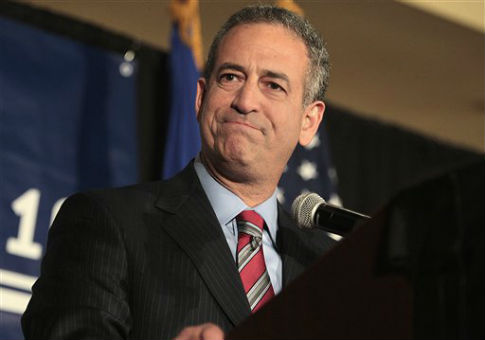Russ Feingold, the former Democratic senator from Wisconsin who is running to regain his old seat, has now taken close to $400,000 in bundled lobbyist contributions despite previously spending 18 years in Washington, D.C., railing against such interests.
According to first quarter campaign finance filings—which spans from Jan. 1 to March 31, 2016—Feingold’s campaign added another $122,983.71 from K Street-aligned groups in the first three months of the year. Russ for Wisconsin had already collected $267,318.95 from such groups up to the end of 2015.
His campaign has now hauled in more than $390,302.66 in bundled lobbyist contributions.
The newly added donations came from just two special interests groups: The J Street PAC—which bundled $45,973.51 in new contributions—and the League of Conservation Voters Action Fund, which pulled together an additional $77,010.20 to his campaign.
The J Street PAC, a liberal Middle East advocacy critical of the Jewish state and in favor of the Iran nuclear deal, has now provided a combined $200,290.13 in bundled lobbyist donations to Feingold—an amount that constitutes more than half of his entire total this election cycle.
J Street announced that Sen. Ron Johnson (R., Wis.), who defeated Feingold in 2010, was one of its top nationwide targets for the 2016 elections. The group was arguably the biggest backer of President Obama’s Iranian nuclear deal, having dumped millions of dollars into a public relations blitz and was a top group in lobbying for support of the deal.
Feingold previously spent 18 years in Washington pushing for campaign finance reform and criticizing the influence of money in politics.
The former senator sharply criticized money in politics and pushed for stricter ethics legislation in 2007 with requirements dealing with the disclosure of bundled lobbyist contributions.
"The public voted for change last November in part because it was sick and tired of the way Washington works. The final lobbying and ethics reform bill that Congress will consider this week is landmark legislation," Feingold said at the time. "It includes a strong lobbyist gift ban, tough new restrictions on privately funded travel and corporate jet flights, much needed additional disclosure of lobbying activities, unprecedented new disclosure of all of the ways that lobbyists provide financial support to members of Congress, including bundling campaign contributions, a provision to slow the revolving door between the halls of Congress and the lobbying world, and far-reaching earmark reform."
Additionally, he said the goal of those in Washington should be to represent the interests of constituents, not well-connected lobbyists.
This is not the first time that donations from lobbyists have poured into Feingold’s campaign despite his rhetoric during his tenure in Congress.
In the final months of the 2010 election cycle, Feingold quietly accepted more than $200,000 in bundled lobbyist contributions that were not made public until after he had lost the election, the Washington Free Beacon previously reported.
Feingold has also held fundraisers at venues this election cycle where he once said lobbyists buy influence from politicians. The first fundraiser was held at D.C.’s 201 bar last November.
"This is obviously part of the issue. It’s not that lobbyists themselves give huge campaign contributions it’s that they become conduits for collecting large contributions," Feingold said during a panel in 2012.
"So in Washington typically a member of the House or Senate will be having, quote, a ‘fundraiser,’ and the lobbyist will bring in a few people and a bunch of checks, and this, you know, this is the same lobbyist who is arranging to have meetings to talk to this guy about policy in his office the next day—hopefully they’re not doing the same thing in the office because that’s illegal—but I mean, it’s across the street. You know, at the 201 Club or the Monocle," Feingold said.
Feingold made his way to the lobbyist-lined K Street to attend a fundraiser earlier that same day.
At least 16 of his former Senate staffers also went on to become lobbyists after leaving his congressional office, the Free Beacon found.
Feingold’s campaign did not return a request for comment on the bundled lobbyist contributions by press time.
